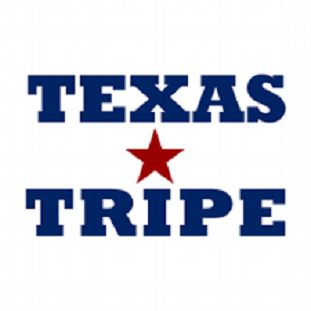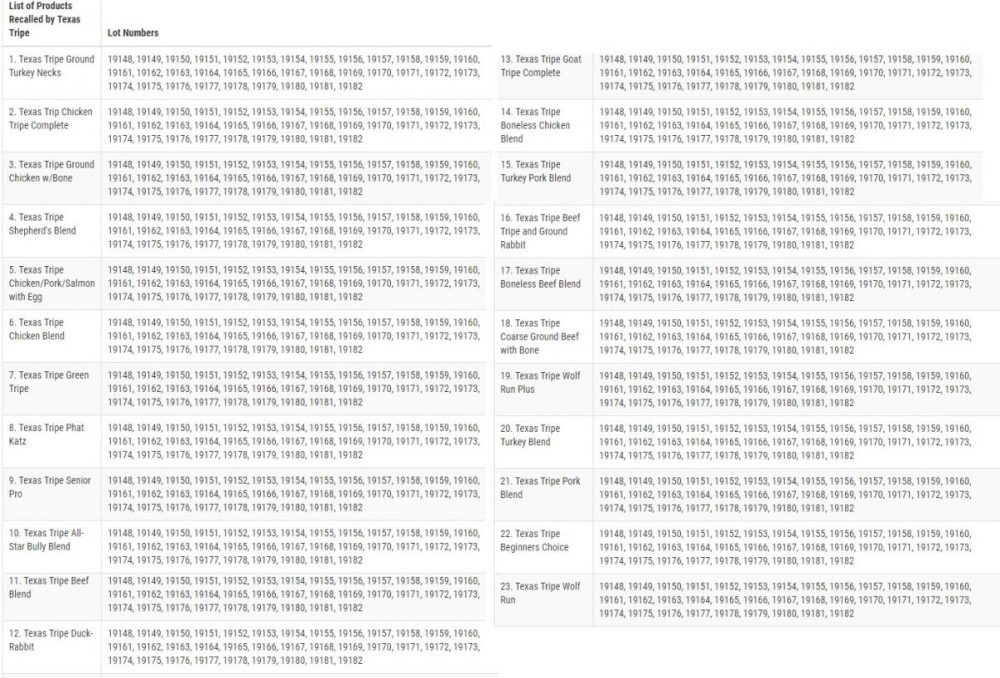FDA Cautions Pet Owners Not To Feed Texas Tripe Inc. Raw Pet Food Due To Salmonella, Listeria

Some lots of Texas Tripe brand raw frozen pet food are being recalled due to several samples of Texas Tripe raw pet food testing positive for Salmonella and/or Listeria monocytogenes, bacteria that can cause illness and death in humans and animals.
The FDA followed that on Aug. 15 with a caution for pet owners to check any Texas Tripe raw frozen food products before feeding their pets to be sure the food is not among the lot numbers listed below before feeding their pets.
“FDA is issuing this alert because these lots of Texas Tripe Inc. raw pet food represent a serious threat to human and animal health. Because these products are sold and stored frozen, FDA is concerned that people may still have them in their possession,” according to the FDA announcement.
The Office of the Texas State Chemist collected 23 finished product samples at Texas Tripe Inc. Of the 23 samples, 16 tested positive for L. mono and/or Salmonella., according to a warning from the US Food and Drug Administration.
The FDA then reportedly conducted an inspection, and collected and analyzed samples of unopened finished product, after the firm performed corrective actions, from additional lots of some of the same products tested by OTSC. FDA testing showed some of the samples contained Salmonella and/or L. mono.
FDA and OSTC shared their test results with Texas Tripe Inc. The firm initiated a recall on July 3, 2019 by directly notifying some of its customers via email.
Samples taken by the FDA that tested positive on Aug. 13 includes, Texas Tripe Chicken Blend – Lot 19196-6; Texas Tripe Pork Blend – Lot 19190-09 and Texas Tripe Beef Blend – Lot 19191-05, according to the FDA release.
The recalled Texas Tripe Inc. products are sold direct to consumers online and by phone in 20- and 40 -pound cases that contain multiple plastic pouches.
Recalled products were sold directly to consumers in Alabama, Arizona, Arkansas, California, Colorado, Florida, Georgia, Illinois, Kansas, Kentucky, Louisiana, Michigan, Mississippi, Missouri, New Jersey, New Mexico, New York, North Carolina, Ohio, Oklahoma, Pennsylvania, Tennessee, Texas, and Virginia, according to the business.
Lot codes to help identify recalled product are printed on the outside of the cases, but the lot codes are not printed on the individual sealed plastic pouches, also known as chubs. Therefore, if the case has been discarded, there are no unique identification numbers on the individual chubs that allow customers to determine that they possess the recalled products, according to the FDA. Those identified should be thrown out.

The FDA recommends those who are unable to determine whether any of the identified product varieties are affected by the recall exercise caution and throw the product away in a secure container where other animals, including wildlife, cannot access it.
Pet foods and treats contaminated with Salmonella and L. mono can affect both human and animal health. Pets can get sick from these pathogens and may also be carriers of the bacteria and pass it on to their human companions without appearing to be ill. People can get sick from handling contaminated pet foods and treats or touching surfaces that have had contact with the contaminated pet foods and treats. Additionally, if a person gets Salmonella or L. mono on their hands, they can spread the bacteria to other people, objects, and surfaces.
Thus, consumers who have had this product in their homes are encouraged to clean refrigerators and freezers where the product was stored; and clean and disinfect all bowls, utensils, food prep surfaces, pet bedding, toys, floors, and any other surfaces that the food or pet may have had contact with. Also, the FCA recommends cleaning up the pet’s feces in yards or parks where people or other animals may become exposed. Consumers should thoroughly wash their hands after handling the recalled product or cleaning up potentially contaminated items and surfaces.
Any who think they have symptoms of Salmonella and L. mono are urged to consult their health care providers. People who think their pets have become ill after consuming contaminated pet food should contact their veterinarians.
FDA encourages consumers to report complaints about pet food products electronically through the Safety Reporting Portal.






